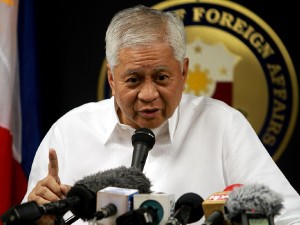Asean tells China: It’s time to talk
MANILA, Philippines—In agreeing to engage China in negotiations for a code of conduct in the West Philippine Sea (South China Sea), the Association of Southeast Asian Nations (Asean) is sending a clear message to Beijing: It’s time to view the territorial disputes in the sea as a regional problem and they must be solved through regional, not bilateral, action.
Foreign Secretary Albert del Rosario took time out from his work on to explain to journalists the ramifications of Thursday’s Asean agreement in Brunei to unite and talk to China about crafting a code of conduct in the West Philippine Sea that would prevent the conflicting territorial claims in the region from erupting in armed confrontations.
Speaking at a briefing for reporters in Malacañang, Del Rosario said that this time, Asean is determined to compel China to sit down with the bloc’s 10 members and negotiate a code of conduct with them.
Asean priority
Article continues after this advertisementHe said Brunei, this year’s Asean chair, made the talks with China on the code a priority for the bloc.
Article continues after this advertisement“I think Asean is fully ready to do this. I think the next step belongs to China,” Del Rosario said.
He said Asean had worked out the “fundamental elements” of a code of conduct “a long time ago” but China refused to engage, saying “the time was not right.”
China refuses to discuss its territorial disputes with its Southeast Asian neighbors in any international forum. It prefers to discuss the disputes through bilateral talks with the other claimants.
Asean members Vietnam, the Philippines, Malaysia and Brunei, as well as Taiwan, claim parts of the West Philippine Sea, almost all of which China insists is its territory.
Asean efforts to craft a code of conduct in the West Philippine Sea all but collapsed last year at a summit chaired by Cambodia, a close economic ally of China, when the group failed to agree on how to approach the issue with China.
Solid stand
But in Brunei on Wednesday and Thursday, Asean presented a “solid” stand to pursue the effort, Del Rosario said.
The 10 members of the association resolved to effectively enforce the Declaration of Conduct in the South China Sea between Asean and China, and to expedite the conclusion of a code of conduct in the sea with China, Del Rosario said.
He said President Aquino took a central role in the discussion of the code during the two-day summit in Brunei.
UN arbitration
“He talked at length about arbitration, about its importance, about the fact that it’s an open, friendly and durable solution to the disputes in the West Philippine Sea,” Del Rosario said, referring to the Philippines’ arbitration case against China in the United Nations (UN).
“He also talked about the benefits to all countries, starting with China. He emphasized that it clarifies the maritime entitlements of China, especially to its own constituents, in terms of what its expectations should be in accordance with international law,” he said.
“It’s good for the Philippines because it will define what is ours,” he said, referring to a UN clarification of the Philippines’ rights in its 22-kilometer exclusive economic zone provided for by the United Nations Convention on the Law of the Sea.
For comprehensive coverage, in-depth analysis, visit our special page for West Philippine Sea updates. Stay informed with articles, videos, and expert opinions.
